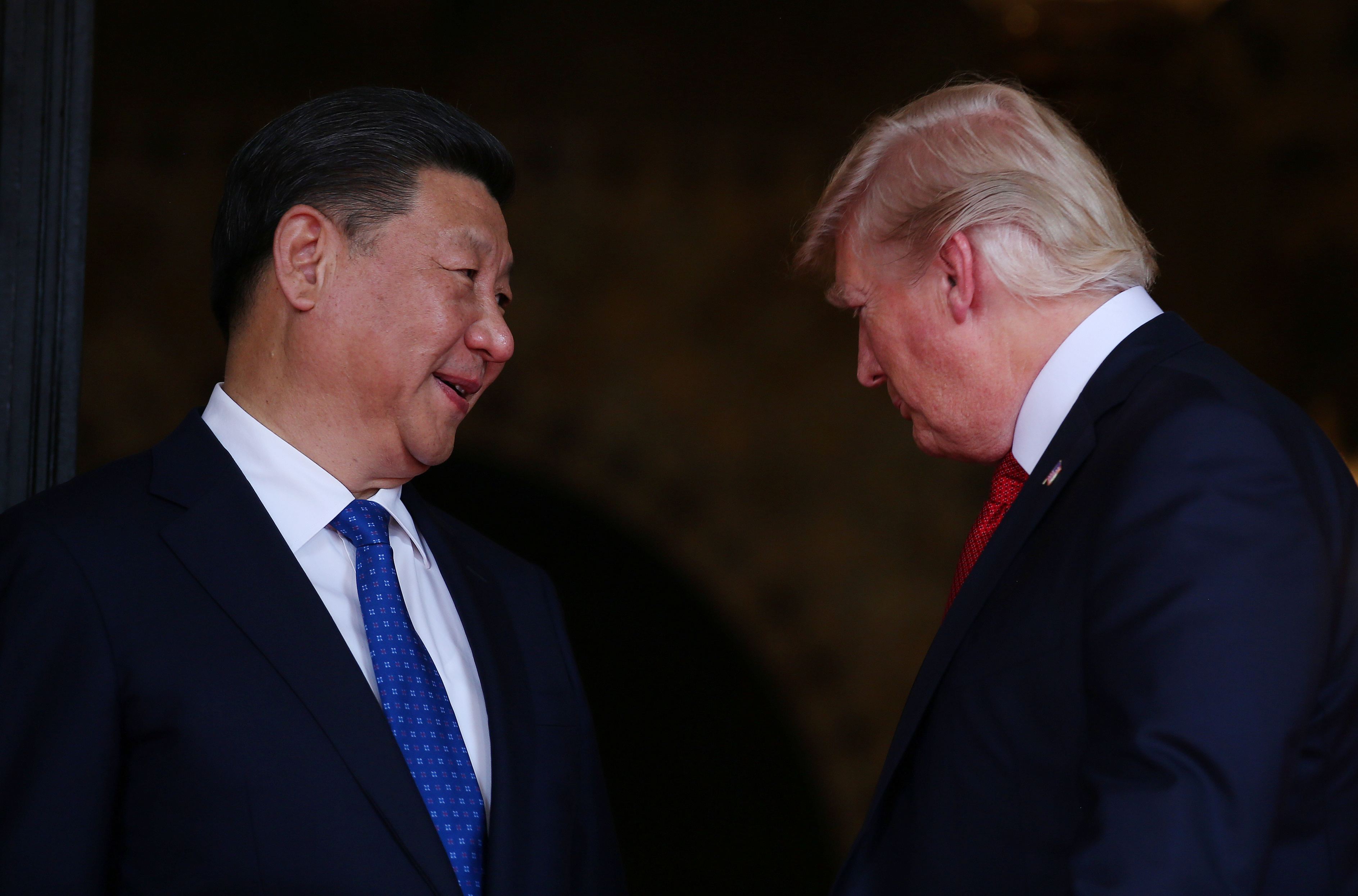China is gleefully trashing Western liberal democracy. It's nonsense.
China's Xi Jinping sees himself at the center of a renewed great-power game. He's succeeding — but not because democracy is broken.


A free daily email with the biggest news stories of the day – and the best features from TheWeek.com
You are now subscribed
Your newsletter sign-up was successful
Upon the news that Chinese President Xi Jinping seems to be seizing power into the indefinite future, observers were quick to point to the declining moral authority of President Trump's America as a check on such authoritarian moves abroad:
There are many reasons for such moves by Mr. Xi and others — including protecting their power and perks in an age of unrest, terrorism, and war amplified by new technologies — but a significant one is that few countries have the standing or authority, morally or otherwise, to speak out — least of all, critics say, the United States."I mean, who is going to punish him internationally now?" asked Susan L. Shirk, the chairwoman of the 21st Century China Program at the University of California, San Diego. [The New York Times]
This is true. And let's ask ourselves honestly: What if China's regnant market-Leninists are right about Trump's America? What if they're right about the proclivities of liberal democracies in general?
Their case, says The Economist, goes something like this: "Over the past year, Mr Xi has sought to present China as a model for other countries, a meritocratic autocracy that has presided over fast economic growth and avoided the muddle and policy lurches that have beset democracies." Last October, Newsweek's Sofia Lotto Persio presciently noted that China's authoritarian leaders are growing more confident in a hybrid system that encourages growth and innovation, but keeps a tight lid on political dissent and individual expression:
The Week
Escape your echo chamber. Get the facts behind the news, plus analysis from multiple perspectives.

Sign up for The Week's Free Newsletters
From our morning news briefing to a weekly Good News Newsletter, get the best of The Week delivered directly to your inbox.
From our morning news briefing to a weekly Good News Newsletter, get the best of The Week delivered directly to your inbox.
Nowhere was this message spelled out more clearly than in an editorial published by the state-controlled news agency Xinhua Tuesday, titled "Enlightened Chinese democracy puts the West in the shade" that praised China's example of stable rule in the face of the "chaos swamping" Western liberal democracies. [Newsweek]
China's case against "chaos" — against empowering the demos — deserves to be taken seriously. Under the management of a one-party technocracy, post-Deng China has pulled off something like a miracle of industrial catch-up:
Sure, dissent isn't tolerated, human rights aren't respected, and crackdowns have been brutal. But you can't compress more than 200 years of Western developmental history into a couple generations (not to mention overseeing the most rapid and high-volume migration of people from country to city in the history of humanity) without breaking a few eggs. Right?
The truth is, such assertions are unprovable. We'll never get to replicate or peer-review China's massive social experiment. What we do know is that China's party leaders and its state media cheerleaders are entirely disingenuous in their critique of liberal-democratic chaos. To the extent that countries like the U.S., Turkey, Hungary, and Poland are "backsliding" toward authoritarianism, they are more becoming more, not less, like China.
The election of Donald Trump was not the result of an over-empowered citizenry. It was made possible by our system's many antidemocratic quirks, or, if you prefer, safeguards. Any number of features led to this unhappy outcome: the Electoral College system itself, of course, plus the winner-take-all rules that govern 48 states' electoral vote apportionment; winner-take-all rules in most Republican primaries; gerrymandered congressional districts and powerful rural Senate seats that prop up Trump's influence over the legislature; and restrictions on voting rights in battleground states.
A free daily email with the biggest news stories of the day – and the best features from TheWeek.com
The chaos that is the Trump administration — and China is right to fear its destabilizing effects on the international system that underpins global trade — has been engineered not by an uninformed, suggestible populace lurching this way or that, but, rather, by a market-dominant minority that is more akin to China's own mandarin elite than it is to America's democratic republic at large.
Consider the issue of official corruption. The self-dealing among Chinese business elites and local party secretaries is legendary. One doesn't have to squint very hard to see it as a model to which President Trump and his family aspire! Or demagoguery and the scapegoating of ethnic minorities: On this score, too, China's communist leaders are more like fellow travelers to Trump, Poland's Mateusz Morawiecki, and Hungary's Viktor Orban than they are an "enlightened democratic" alternative.
At the end of the day, China's Xi Jinping likely sees himself at the center of a renewed great-power game. In effect, he wants to "make China great again," to recover his people's once-glorious place in the world before it was eclipsed by the West. At the moment, he is succeeding in part because, ironically, the United States under Trump is acting like China: insular, fearful, lacking in social trust, given to corruption, and unaccountable to its people.
Scott Galupo is a freelance writer living in Virginia. In addition to The Week, he blogs for U.S. News and reviews live music for The Washington Post. He was formerly a senior contributor to the American Conservative and staff writer for The Washington Times. He was also an aide to Rep. John Boehner. He lives with his wife and two children and writes about politics to support his guitar habit.
-
 Film reviews: ‘Send Help’ and ‘Private Life’
Film reviews: ‘Send Help’ and ‘Private Life’Feature An office doormat is stranded alone with her awful boss and a frazzled therapist turns amateur murder investigator
-
 Movies to watch in February
Movies to watch in Februarythe week recommends Time travelers, multiverse hoppers and an Iraqi parable highlight this month’s offerings during the depths of winter
-
 ICE’s facial scanning is the tip of the surveillance iceberg
ICE’s facial scanning is the tip of the surveillance icebergIN THE SPOTLIGHT Federal troops are increasingly turning to high-tech tracking tools that push the boundaries of personal privacy
-
 The billionaires’ wealth tax: a catastrophe for California?
The billionaires’ wealth tax: a catastrophe for California?Talking Point Peter Thiel and Larry Page preparing to change state residency
-
 Bari Weiss’ ‘60 Minutes’ scandal is about more than one report
Bari Weiss’ ‘60 Minutes’ scandal is about more than one reportIN THE SPOTLIGHT By blocking an approved segment on a controversial prison holding US deportees in El Salvador, the editor-in-chief of CBS News has become the main story
-
 Has Zohran Mamdani shown the Democrats how to win again?
Has Zohran Mamdani shown the Democrats how to win again?Today’s Big Question New York City mayoral election touted as victory for left-wing populists but moderate centrist wins elsewhere present more complex path for Democratic Party
-
 Millions turn out for anti-Trump ‘No Kings’ rallies
Millions turn out for anti-Trump ‘No Kings’ ralliesSpeed Read An estimated 7 million people participated, 2 million more than at the first ‘No Kings’ protest in June
-
 Ghislaine Maxwell: angling for a Trump pardon
Ghislaine Maxwell: angling for a Trump pardonTalking Point Convicted sex trafficker's testimony could shed new light on president's links to Jeffrey Epstein
-
 The last words and final moments of 40 presidents
The last words and final moments of 40 presidentsThe Explainer Some are eloquent quotes worthy of the holders of the highest office in the nation, and others... aren't
-
 The JFK files: the truth at last?
The JFK files: the truth at last?In The Spotlight More than 64,000 previously classified documents relating the 1963 assassination of John F. Kennedy have been released by the Trump administration
-
 'Seriously, not literally': how should the world take Donald Trump?
'Seriously, not literally': how should the world take Donald Trump?Today's big question White House rhetoric and reality look likely to become increasingly blurred
